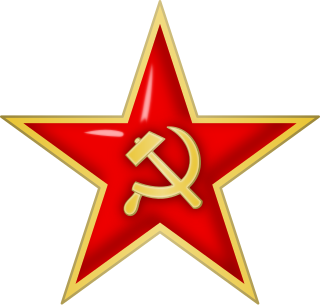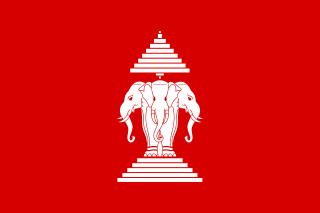A lieutenant is a junior commissioned officer rank in the armed forces of many nations, as well as fire services, emergency medical services, security services and police forces.
The Royal Lao Air Force, best known to the Americans by its English acronym RLAF, was the air force component of the Royal Lao Armed Forces (FAR), the official military of the Royal Lao Government and the Kingdom of Laos during the Laotian Civil War between 1960 and 1975.
Corporal is a military rank in use by the armed forces of many countries. It is also a police rank in some police services. The rank is usually the lowest ranking non-commissioned officer. In some militaries, the rank of corporal nominally corresponds to commanding a section or squad of soldiers.
This is a table of the ranks and insignia of the Canadian Armed Forces. As the Canadian Armed Forces is officially bilingual, the French language ranks are presented following the English.
Officer cadet is a rank held by military cadets during their training to become commissioned officers. In the United Kingdom, the rank is also used by members of University Royal Naval Units, University Officer Training Corps and University Air Squadron; however, these are not trainee officers with many not choosing a career in the armed forces.

Modern Russian military ranks trace their roots to the Table of Ranks established by Peter the Great. Most of the rank names were borrowed from existing German/Prussian, French, English, Dutch, and Polish ranks upon the formation of the Russian regular army in the late 17th century.
The comparative military ranks of Korea are the military insignia used by the two nations on the Korean Peninsula, those being the Republic of Korea Armed Forces and the Korean People's Army of the Democratic People's Republic of Korea. The United States Forces Korea personnel wear the ranks and insignia used by other service personnel of the United States Armed Forces in the territories of the United States.

The Ranks of the Imperial Japanese Navy were the rank insignia of the Imperial Japanese Navy, used from its creation in 1868, until its dissolution in 1945 following the Surrender of Japan in World War II. The ranks were inspired by the ranks of the Royal Navy And also from the former navy of the Tokugawa shogunate.

The military ranks of the Soviet Union were those introduced after the October Revolution of 1917. At that time the Imperial Russian Table of Ranks was abolished, as were the privileges of the pre-Soviet Russian nobility.
The Indonesian National Armed Forces (TNI) uses a simplified ranking system for the three branches of Indonesian Army, Indonesian Navy and Indonesian Air Force. Most of the ranks are similar with differences for the rank titles of the high-ranking officers. Exception exists, however, in the ranks of the service members of the Indonesian Marine Corps. While Indonesian Marine Corps is a branch of the Navy, the rank titles of the Marine Corps are the same as those of the Army, but it still uses the Navy's style insignia.
Lieutenant is a Canadian Forces rank used by commissioned officers of the Canadian Army or Royal Canadian Air Force. Sub-lieutenant is the equivalent rank in the Royal Canadian Navy. Lieutenants and sub-lieutenants are equivalent to ranks with a NATO code of OF-1.

Gorget patches are an insignia in the form of paired patches of cloth or metal on the collar of a uniform (gorget), used in the military and civil service in some countries. Collar tabs sign the military rank, the rank of civil service, the military unit, the office (department) or the branch of the armed forces and the arm of service.

Kapitan is used manifold as rank, grade, or rank designation in the Army, Air Force or Navy of numerous countries and armed forces. In member countries of NATO-alliance Kapitan is a commissioned officer rank, rated OF-2 in line to the NATO officers rank system. The almost equivalent OF-2 officer, e.g. in the US Army, is the Captain rank.

The Royal Lao Army, also designated by its anglicized title RLA, was the land component of the Royal Lao Armed Forces (FAR), the official military of the Kingdom of Laos during the North Vietnamese invasion of Laos and the Laotian Civil War between 1960 and 1975.

The military ranks of the Armed Forces of Ukraine (AFU) were established in March 1992, when Ukraine adopted the Law on Military Duty and Military Service 1992.

The Royal Lao Navy was the naval component of the Royal Lao Armed Forces (FAR), the official military of the Royal Lao Government and the Kingdom of Laos during the Laotian Civil War between 1960 and 1975.
Individual rank insignia to the (Army) ground forces and (Navy) naval forces (1935–1940) were established by orders 2590 and 2591, effective from September 22, 1935.

The ranks and rank insignia of the Red Army and Red Navy between 1940 and 1943 were characterised by continuing reforms to the Soviet armed forces in the period immediately before Operation Barbarossa and the war of national survival following it. The Soviet suspicion of rank and rank badges as a bourgeois institution remained, but the increasing experience of Soviet forces, and the massive increase in manpower all played their part, including the creation of a number of new general officer ranks and the reintroduction of permanent enlisted ranks and ratings.
Between 1943 and 1955, the ranks and insignia of the Soviet Armed Forces were characterised by a number of changes, including the reintroduction of rank insignia badges and the adoption of a number of higher ranks.








































































